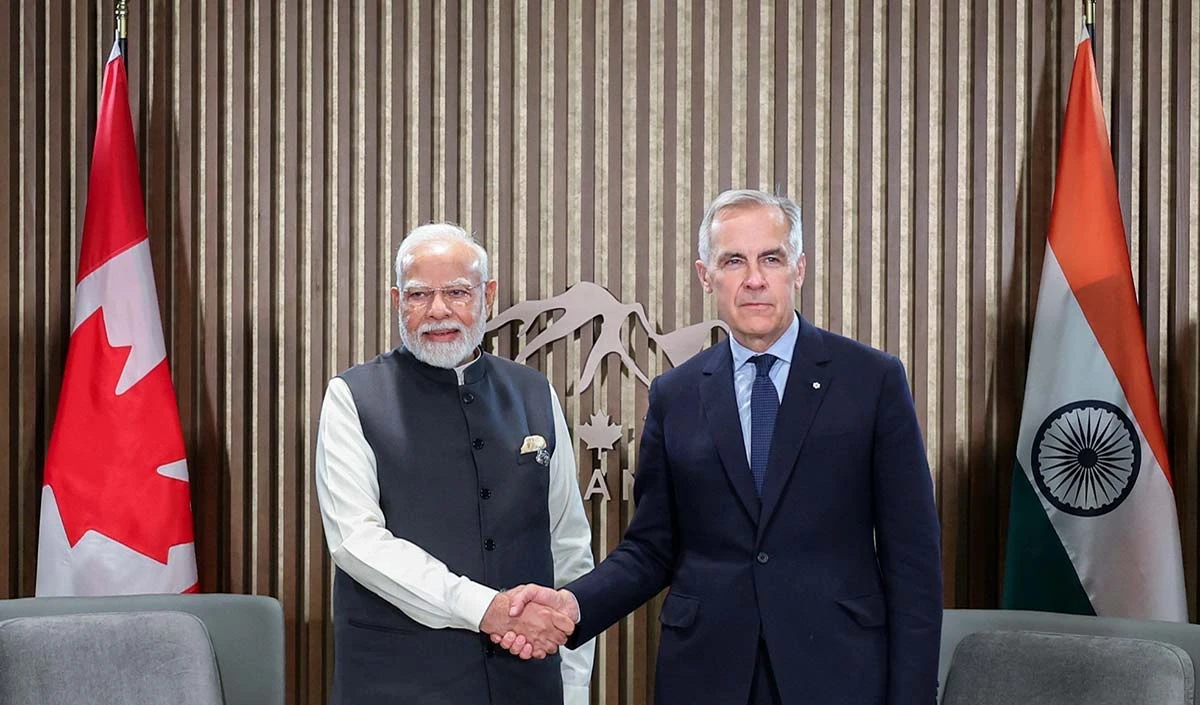The improvement relationship between Canada-India can be mutually beneficial for the two countries, as the two countries are on the target of international superpower like America. On the one hand, while the US wants to mix Canada in its state, on the other hand the US wants to let India down on various international forums, so that its global grandfather remains intact. Since India and Canada have a new twist in relations and after nearly two years of conflict, Canada has made a major disclosure.
Canadian intelligence agency CSIS has admitted that Khalistani extremist (terrorists) sitting in Canada are using its earth to collect violence, publicity and funds against India. The intelligence report states that Khalistani extremists (separatists) are running activities against India from Canada. Since the 1980s, Canada -based Khalistani extremists (CBKE) have violently campaigned to create an independent Sikh state in Punjab.
ALSO READ: G-7 summit in Canada’s global significance of India’s advice
This report also mentions the 1985 Air India bomb blast. Due to which the claim of India has been strengthened, in which he has been saying that Canada is giving shelter to terrorists. CSIS revealed that Pakistan is trying to reduce India’s influence in Canada. This is a diplomatic victory for India. This makes it clear that the anti -India countries are using the land of other countries.
In fact, this has come to light when Prime Minister Narendra Modi and Canada’s PM Mark Carney met during the G7 Summit held in Canada recently and talked in a very positive environment to bring back the bilateral relationships back on track.
Earlier, Canadian Prime Minister Carney described the meeting with Modi as ‘basic’. This means that both countries want to forget the previous things and move forward. However, India is not going to forget the previous things. This is the reason that many strategic agreements have also been done between the two countries, so that both mutual trust and business will increase. Ambassadors have also been appointed for this.
It is noteworthy that India has been accusing Canada of adopting a soft attitude over Khalistani separatists for a long time. But now this official report of the Canadian government has justified India’s complaint. However, CSIS has also assumed that Pakistan is engaged in promoting the ongoing activities against India from the land of Canada. Let us know that during PM Modi’s visit to Canada, Khalistani groups had even dancing to threaten him.
In such a situation, a direct question arises that without the instigation of those who sympathize with them in Canada and the backing of Pakistan, they would ever muster so much courage? Therefore, the supplementary question is that when Canada assumed that violent conspiracies are being carried out against India from its land with the jugalbandi of Pakistan-Khalistanis, then what expectations can India expect from him? This is not that Canada should hand over terrorists to India, completely eliminate Khalistani network and consider separatism as terrorism.
At the same time, this report also states that, “Indian officials, including their Canadian proxy agents, are involved in many activities. They aim to influence Canadian communities and politicians. It has been claimed that when these activities are misleading, secret or threatening, they are considered foreign intervention. However, India has already been implemented. It is also said that Pakistan, Russia and Iran have also been named in the report for Canada that the biggest intelligence for Canada.
The report claimed that the Hardeep Singh Nijjar case has revealed the relationship between the Government of India and the criminal network. It said that Khalistani extremism is promoting Indian foreign intervention activities in Canada. India has categorically denied its involvement in Nijjar’s death and has also rejected allegations of intervention made by Canada.
Let us know that after the murder of Khalistani terrorist Hardeep Singh Nijjar in British Columbia in the year 2023, there was a sharp tension in the relationship between the two countries. Canadian officials linked the murder with the intervention of the Indian government, which India denied, described these allegations as absurd and baseless. In response to this, India accused Canada of sheltering Khalistani extremists and ignoring their activities.
The Yaksha question is what will happen to the Jugalbandi of Khalistanis with Pakistan, because the Canadian confession on terrorism is being seen as a major victory in India. Since the relations between India and Canada have changed, this will increase the restlessness of Khalistanis. Because India has clearly told Canada to hand over the terrorists and eliminate the Khalistani network. India has asked to hand over 26 terrorists, out of which only 5 have taken action.
It is expected that Canada will now show action in this matter. These include a case of Arsh Dalla, on which more than 50 criminal cases are registered in India. Dalla was also granted bail by the Canadian court. India has also asked Canada to arrest the fugitives and take action on the red corner notice. However, no action has been taken so far in many cases. India is angry with this.
However, it is difficult for Carney to take action against terrorism without annoying pro -Khalistan Sikhs in Canada. The reason is that organizations such as the World Sikh Organization (WSO) are quite impressive in Canada. Therefore, it is not easy for Canada to take action against terrorists. This is why such anti-India organizations had completely dominated in Justin Trudeau’s government. However, politically Carney is not so fascinated by him, but it is equally true that Canadian separatists of Indian origin have become very big vote banks there. Nevertheless, a ray of hope remains. Because both countries are talking about creating a joint working group to deal with terrorism and organized crime.
Actually, in the changing global scenario, India’s message is clear, ‘Now more double attitude will not run of any country.’ Even though Canada talks about liberalism and freedom of speaking, but even those who commit violence against India cannot be blind. This is the reason why Carney said as soon as the meeting with Modi ended, ‘A lot of work is yet to be done.’ It is a major victory for India that the Canadian intelligence agency is now accepting the claims of India only after the direct meeting of the two leaders. In a way, it can be said that it is not the end of the Khalistan problem, but it has started on the land of Canada.
It is clear that if you want to weaken America, then your situation in Canada should naturally be strong. With this, you will be able to monitor various activities of America, but you cannot do this openly! You can do it as a hidden rustam only. Often, such a strategy strategy continues to be made by mutual competitive countries of the world and the people involved in their network. This is the reason why the interactions of the strong rival countries of America like China, Russia, India, Iran etc. have increased in Canada. However, the Canadian government is also careful with this.
It is clear that the following five things seem to be clear from the changing relations between India and Canada, which have their own global meanings. First, the Canadian intelligence agency (CSIS) has admitted that Khalistani extremists are using the Canadian land to spread violence against India. Second, despite the threats of Sikh separatist groups, PM Narendra Modi’s Canadian visit was concluded peacefully, which could be termed as a victory of diplomacy over threats. Third, in the Canadian intelligence report, Pakistan has also been accused of joining the anti-India agenda, which has once again exposed Pakistan. The meeting of IV, Modi (India) and Carney (Canada) is being seen as an improvement in relationships, but India is meant not only by things, but by concrete action. It is clear that the relationship between the two countries has started a new beginning, but with empirical terms, it is a very big thing.
– Kamlesh Pandey
Senior journalist and political analyst

